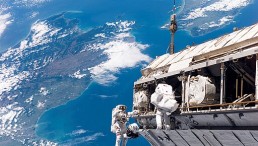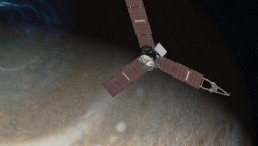Sunday evening at 10:50 p.m., a SpaceX Falcon 9 rocket lifted off from Cape Canaveral, Florida carrying satellites for two different customers, Eutelsat and Asia Broadcast Satellite.
The two companies jointly financed the satellite construction and launch with the satellites being built by Boeing. These satellites are unique. Instead of conventional rocket thrusters, they are powered by electric propulsion. Using this type of propulsion reduced the weight of the satellites significantly allowing them both to be launched at the same time. However, it will take these satellites much longer to reach geostationary orbit compared to satellites powered by traditional thrusters.
Eutelsat's new satellite will joins its network of broadcasts satellites, giving the company coverage to its customers from Alaska and Canada to South America. The Asia Broadcast Satellite will be used to provide customers on several continents with TV signals, Internet backhaul, and cellular service.
SpaceX has been experimenting with making the first stage of its rockets reusable, a move the company says could save millions in launch costs. The company has been attempting to land the first stage of its rockets after takeoff although no landing was attempted with this launch.
"Next landing attempt will be 3rd launch from now," SpaceX CEO Elon Musk tweeted. "Tonight's flight and following one will not have enough propellant."
The Falcon rocket has been designed by SpaceX from the very beginning to be a reusable craft. To that end, the company continues to modify the system in the hopes of making this a reality. The company has already tested the ability of its rocket to land after take off with limited success.
In a separate tweet, Musk also indicated that SpaceX is making changes to its next generation of Falcon 9 rockets that the company hopes will improve the prospects of them becoming reusable. If successful, the company hopes to significantly reduce the costs of their missions making space travel more affordable than it has ever been.
The next launch for the company comes in under a month on March 21, when a Falcon 9 will blast off to deliver a communications satellite into orbit for Thales Alenia Space and the government of Turkmenistan.
SpaceX was founded in 2002 by former PayPal founder Elon Musk with the goal of reducing space transportation costs to enable eventual colonization of Mars. The company's first successful launch of its Falcon 1 came on September 28, 2008 making SpaceX the first privately held company to successfully launch, orbit and recover spacecraft.














